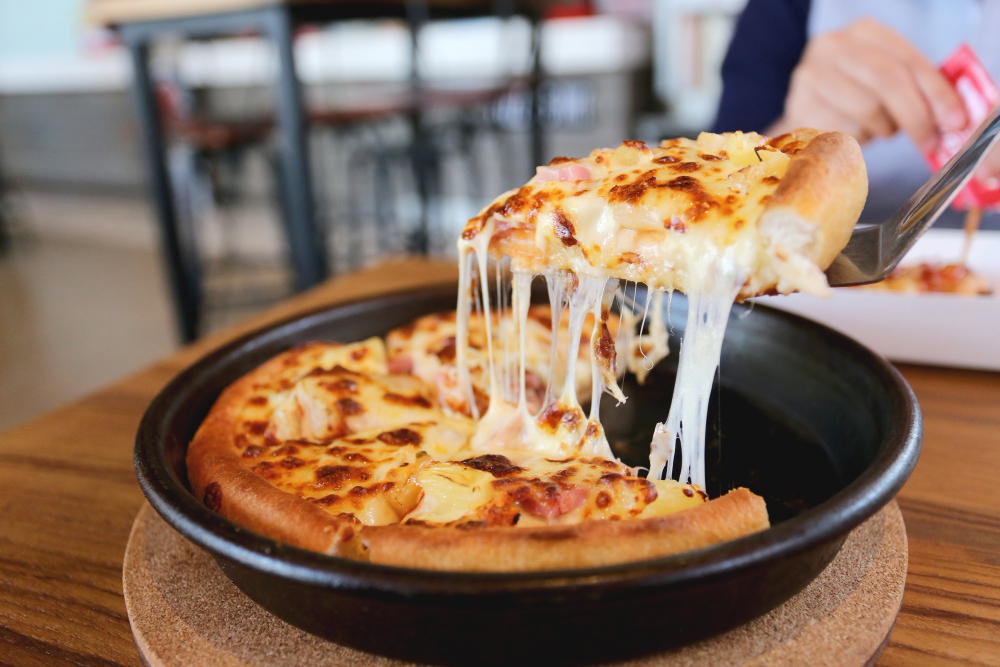The addition of cheese is a defining moment in the pizza-making process. The way cheese melts can significantly impact the overall taste and texture of your pizza. To ensure a delightful, gooey experience, it’s crucial to understand when and how to add cheese to your pizza. In this guide, we’ll walk you through the art of cheese placement and timing for the ultimate pizza indulgence.
Cracking the Cheese Code
When Should You Add Cheese to Your Pizza? Mastering the Melting Technique
Pre-Baking Cheese Layer
Adding a thin layer of cheese directly onto the pizza dough before baking is a common technique. This layer acts as a barrier, preventing the dough from becoming soggy due to the moisture from the sauce. It also contributes to a crispy texture on the bottom of the crust. Use cheeses like mozzarella, cheddar, or provolone for this layer.
Mid-Baking Cheese Addition
Many pizzaiolos prefer adding cheese halfway through the baking process. This technique ensures that the cheese melts evenly and forms a golden, bubbly top layer. As the sauce and toppings cook, the cheese integrates seamlessly with the flavors. This method is ideal for achieving that iconic pizza stretch. Opt for mozzarella, fontina, or gouda.
Finishing Touch: Post-Baking Cheese
For a fresh and gooey finish, add a generous amount of cheese to your pizza immediately after it’s out of the oven. The residual heat will cause the cheese to melt slightly, creating a velvety layer that’s a delight for the senses. Freshly grated Parmesan, asiago, or pecorino romano work wonders for this final touch.
Read More: Best Cheese Options for Cheesy Breadsticks
Experimenting with Cheese Combinations
Best Cheese Options for the Ultimate Pizza Experience: A Blend of Taste and Texture
The Classic Trio: Mozzarella, Parmesan, and Cheddar
The combination of mozzarella for stretch, Parmesan for depth, and cheddar for sharpness creates a balanced and flavorful pizza.
Mediterranean Medley: Feta and Kalamata Olives
Channel the flavors of the Mediterranean by adding crumbled feta and sliced kalamata olives. This combination offers a tangy and salty contrast to your pizza.
Gourmet Adventure: Blue Cheese and Caramelized Onions
For an elevated experience, experiment with blue cheese and caramelized onions. The pungent richness of blue cheese pairs harmoniously with the sweetness of caramelized onions.
Vegan Delight: Vegan Mozzarella and Roasted Veggies
Explore plant-based options by using vegan mozzarella and an array of roasted vegetables. This combination offers a burst of color, flavor, and healthiness.
Spicy Fusion: Pepper Jack and Jalapenos
Add a kick to your pizza with pepper jack cheese and sliced jalapenos. The heat from the jalapenos is balanced by the creamy texture of the cheese.
Read More: 5 Mistakes to Skip When Making Bread
FAQs
Q: Can I mix different cheeses for a unique flavor?
A: Absolutely! Combining different cheese types can create exciting flavor profiles.
Q: How do I prevent the cheese from burning?
A: Keep an eye on your pizza during baking and adjust the temperature or cooking time as needed to prevent burning.
Q: Can I use shredded cheese or should I opt for slices?
A: Both shredded and sliced cheese work well. Choose the option that best suits your pizza-making technique.
Q: Is there a specific cheese that melts best?
A: Cheeses like mozzarella, fontina, gouda, and provolone are renowned for their excellent melting properties.
Q: Can I use non-dairy cheese alternatives?
A: Yes, many non-dairy cheese options melt similarly to traditional cheeses. Experiment with different brands to find your favorite.
Conclusion
The journey of adding cheese to your pizza is a creative endeavor that offers endless possibilities. Whether you’re a fan of gooey stretches or crispy tops, the way you add cheese can transform your pizza into a culinary masterpiece.
Experiment with different cheeses, techniques, and combinations to find the perfect match for your taste buds. With the right knowledge and a sprinkle of creativity, you’ll be crafting pizza perfection with every slice.



